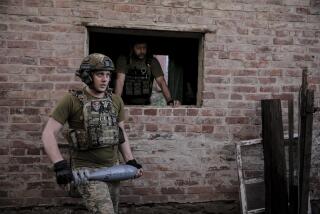A Partisan Panel Scatters Poppycock
Twelve Republican House members, constituted as the Cox Commission on Russia, have issued a report on the Clinton administrationâs policy toward Russia that amounts to âsound and fury,â in Shakespeareâs fine phrase, âsignifying nothing.â Nothing except that, in the midst of a presidential campaign, a dozen Republican members of Congress dislike Clinton and Al Gore and support Texas Gov. George W. Bush.
Almost a decade has passed since the Soviet Union disappeared. President Bush and then President Clinton sought to fashion U.S. policy toward an unprecedented transformation in the entire international system. The Clinton administrationâs choices and actions regarding Russia should certainly be examined and debated. But American stakes in our policy toward Russia are too important to be submerged in partisan âpoppy-Cox.â
The starting place for an analysis of our Russia policy should begin with a simple question: Why does Russia matter? Why does Russia rank among the two or three nations on Earth in which developments could have the largest impact on Americansâ lives and liberties?
With one-seventh of the worldâs land mass, 150 million citizens, natural resources that rank at the top tier in every important category, a scientific and technical elite that rivaled Americaâs for four decades, and a culture that has contributed to the world canon, Russia matters.
If this were the whole story, Russia would count among the score of countries important for American policymakers. Instead, its priority in the hierarchy of American interests derives from one irreducible fact: History has left a superpower arsenal of nuclear and biological weapons, missiles and know-how in the midst of a revolution that is deconstructing every sinew of the totalitarian Soviet state.
Start with 7,000 active nuclear warheads--armed, mounted on missiles, capable of arriving at targets in the U.S. less than an hour after launch. Add to this picture 5,000 tactical nuclear weapons. Remember an additional 12,000 nuclear weapons in various decaying storage facilities across Russia. Include large stockpiles of highly enriched uranium and plutonium--ingredients from which a crude nuclear device could be assembled.
In sum: The overriding reason Russia must matter appears vividly as one considers the danger of âloose nukesâ--the theft of one or a dozen weapons, sale to a rogue state or terrorist group, and use of these weapons to attack American soldiers abroad or destroy a city on U.S. soil.
How has the Clinton administration dealt with Russia on this most important issue? According to the Cox report, âthe administration has consistently de-emphasized proliferation in discussions with Russia.â But examine the facts.
In 1992, three newly independent states--Ukraine, Kazakhstan and Belarus--found themselves with the third-, fourth- and fifth-largest nuclear arsenals in the world. American leadership, especially through Vice President Goreâs Bilateral Commission, succeeded in eliminating three superpower arsenals. How many nuclear weapons do those three states have today? Zero.
A big instrument in preventing proliferation of thousands of nuclear weapons has been the Nunn-Lugar Cooperative Threat Reduction Program. A bipartisan congressional initiative, these programs assist Russia in dismantling and safely disposing of its superpower arsenal. Under Clinton and Gore, Nunn-Lugar programs have invested about $500 million annually and eliminated more than 5,000 nuclear weapons previously aimed at the U.S., as well as hundreds of missile launchers and submarines. They have also helped secure remaining weapons and weapons-useable nuclear material at sites across Russia.
About these programs, which in fact constitute the largest source of U.S. taxpayer assistance to Russia, the Cox report is silent. Had the commission criticized the administration for being too timid or doing too little on this front, I might agree. But its members know that a Republican-led Congress has been the major obstacle to a bolder, expanded program.
Those who seek to serve as our next president should speak about how they propose to engage Russia in the next four years. Unfortunately, by failing to establish a bipartisan commission that would have analyzed success and failures evenhandedly, the Cox Commission missed an opportunity to inform that debate.
The president who takes office in January should give highest priority to securing Russian nuclear weapons, weapons-usable nuclear material and other weapons of mass destruction. Protection of Americansâ lives and liberties--not partisan politics--should take precedence in shaping Americaâs Russia policy.
More to Read
Get the L.A. Times Politics newsletter
Deeply reported insights into legislation, politics and policy from Sacramento, Washington and beyond. In your inbox three times per week.
You may occasionally receive promotional content from the Los Angeles Times.










